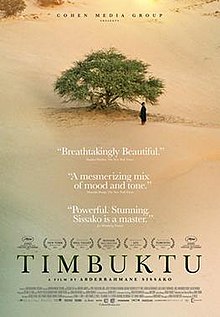Timbuktu (2014 film)
| Timbuktu | |
|---|---|

Theatrical release poster
|
|
| Directed by | Abderrahmane Sissako |
| Produced by | Sylvie Pialat Étienne Comar |
| Written by |
|
| Starring |
|
| Music by | Amine Bouhafa |
| Cinematography | Sofian El Fani |
| Edited by | Nadia Ben Rachid |
|
Production
company |
|
| Distributed by | Cohen Media Group |
|
Release date
|
|
|
Running time
|
96 minutes |
| Country |
|
| Language | |
| Box office | $10 million |
Timbuktu is a 2014 French-Mauritanian drama film directed by Abderrahmane Sissako. It was selected to compete for the Palme d'Or in the main competition section at the 2014 Cannes Film Festival. At Cannes, it won the Prize of the Ecumenical Jury and the François Chalais Prize. It was nominated for the Academy Award for Best Foreign Language Film at the 87th Academy Awards, and has been nominated for the BAFTA Award for Best Film Not in the English Language at the 69th British Academy Film Awards. It won Best Film at the 11th Africa Movie Academy Awards.
The film looks at the brief occupation of Timbuktu, Mali by Ansar Dine. Parts of the film were influenced by a 2012 public stoning of an unmarried couple in Aguelhok. It was shot in Oualata, a town in south-east Mauritania.
The city of Timbuktu is under the occupation of extremist Islamists bearing a jihadist black flag. Kidane is a cattle herder who lives outside of the city. One day, one of his cows accidentally damages the net of a fisherman. The enraged fisherman kills the cow. Kidane confronts the fisherman and accidentally shoots him dead. The jihadists arrest Kidane and, per sharia law, demand a blood money payment of 40 cattle to the fisherman's family. As Kidane has only seven cattle, he is sentenced to death. His wife shows up at his execution with a pistol, and as they run to each other the husband attempts to stop her. The executioners gun them both down.
...
Wikipedia
